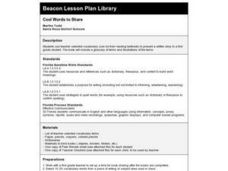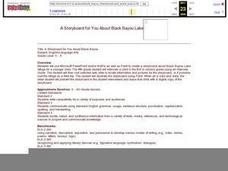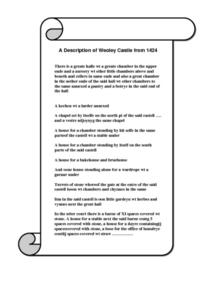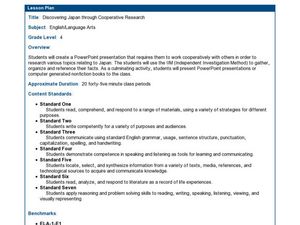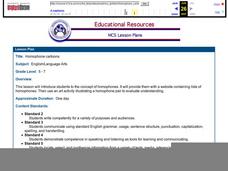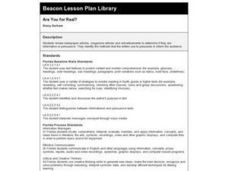K12 Reader
Glossary of Non-Violence
Make sure your class is sure of terminology when referring to the non-violent methods used in the civil rights movement. This glossary includes 19 terms paired with parts of speech and definitions.
EngageNY
Organizing Evidence from Multiple Informational Texts to Prepare for Writing: What Makes an Earthquake a Natural Disaster?
Fifth graders prepare for their end of the unit essay assessment by continuing to look at what makes an earthquake a natural disaster. They complete a graphic organizer and write a topic sentence. To finish, they view a model essay and...
EngageNY
End of Unit Assessment, Part 1: On-Demand Essay “What Makes A Hurricane A Natural Disaster?”
It's time to refine writing and word choice. Learners work on Part 1 of their end of unit assessment by creating an essay titled What Makes a Hurricane a Natural Disaster? They use glossaries and graphic organizers from previous lessons...
Teach It Primary
The Pied Piper of Hamelin
Six tasks make up a lesson plan designed to reinforce comprehension and language skills using the poem "The Pied Piper" by Robert Browing. Scholars discuss and define unknown words, identify adjectives and onomatopoeia, review complex...
University Interscholastic League
English Lesson to Prepare for UIL Spelling and Vocabulary Contest
"i before e. . ." Spelling is easier if kids know the eight basic spelling rules contained in this resource packet.
Curated OER
Bryant Creek Watershed Project - Making a Karst Dictionary
Students explore the definitions relevant to Karst topography. They develop a Bryant Watershed Dictionary of the special words and terms that are used to talk about the topography and hydrology of the area they live in.
Curated OER
Cool Words to Share
Fifth graders use teacher-selected vocabulary to present a written story to a first grade student. The book include a glossary of terms and illustrations of the terms. This is a great instructional activity for big/little buddies to do...
Curated OER
The Human Face of Flagstaff
Students make a brochure for Flagstaff, Arizona. In this geography instructional activity, students look at a map of Arizona and the Flagstaff Chamber of Commerce sheet to find natural and human features of the city. They create a...
Curated OER
Creating Storyboards for Younger Students
Students create electronic storyboards for younger children about a nearby refuge and lake. After interviewing the younger students about their impressions of the lake, they use Powerpoint to make the storyboard, including the interview,...
Curated OER
A Description of Weoley Castle From 1424
In this description of Weoley Castle worksheet, students read a description of the castle in old English and refer back to the glossary for interpretation of certain words and phrases.
Curated OER
Discovering Japan Through Cooperative Research
Search a variety of sources to create a multimedia or book project about Japan. Learners use the independent investigation method to plan and conduct research about Japan. They use the information they discover to create a computer book...
Curated OER
Homophone Cartoons
A terrific lesson on homophones awaits your youngsters. First, pupils access a website that contains lists of homophones. Then, it's time to get creative! Everyone gets a piece of poster board and they create a homophone cartoon -...
Curated OER
Antonyms, synonyms and homophones
Shed light on what antonyms, synonyms, and homophones are. In this lesson, upper elementary schoolers create pairs using an antonym, a homophone, and/or a synonym. Then they play an antonym matching game.
Night of Mystery
Pirate Words and Phrases
Avast, ye mateys! A full dictionary of pirate phrases and words is sure to get your little pirates in a mood for sailing, reading, or writing. It features a basic list of terms as well as a more extensive dictionary for your class to be...
Curated OER
Paraphrasing and Summarizing
Read an article about the migration of our ancestors and write a paragraph. Pupils paraphrase and summarize to restate the information found in a nonfiction text. They write a shortened version of the reading to demonstrate the...
Curated OER
Analyzing Two or More Nonfiction Texts
How does recognizing the author's purpose help you draw conclusions about a topic? Using two articles (both are attached), learners brainstorm why each author wrote each article. Are their purposes similar or different? Learners use a...
Curated OER
Writing and Presenting a Fable Using Research
Elementary and middle schoolers research animal facts and use them in a fable. First, they pair-share to find animal traits to use in writing a fable. They then complete a prewriting worksheet. After going through the writing process,...
Curated OER
Using Context
Teams practice decoding and using context strategies to determine the meanings of unfamiliar words. After verifying the meanings of words through the use of dictionaries, the Internet, thesauruses, and other sources, learners write the...
Curated OER
Nonfiction Text elements
Students research Lewis and Clark and use the information for a book. In this Lewis and Clark instructional activity, students gather information and complete worksheets in an activity to write a book. Students use a variety of text...
Curated OER
Are You For Real?
Students try to find newspaper and magazine articles that are informative or persuasive. They practice determining the differences between the two types of articles. They identify the devices authors use to persuade the audience.
Curated OER
Just the Facts, Ma'am
Students use tables of content, chapter titles, and key words as a strategy for organizing non-fiction information. They write a paragraph with a partner using information from a graphic organizer.
Curated OER
Lesson 4:Writing a Letter
Students write business letters and emails. In this letter lesson, students use the seven-day road trip they had planned in a previous lesson and contact the Chambers of Commerce for the cities they plan to visit. They write business...








